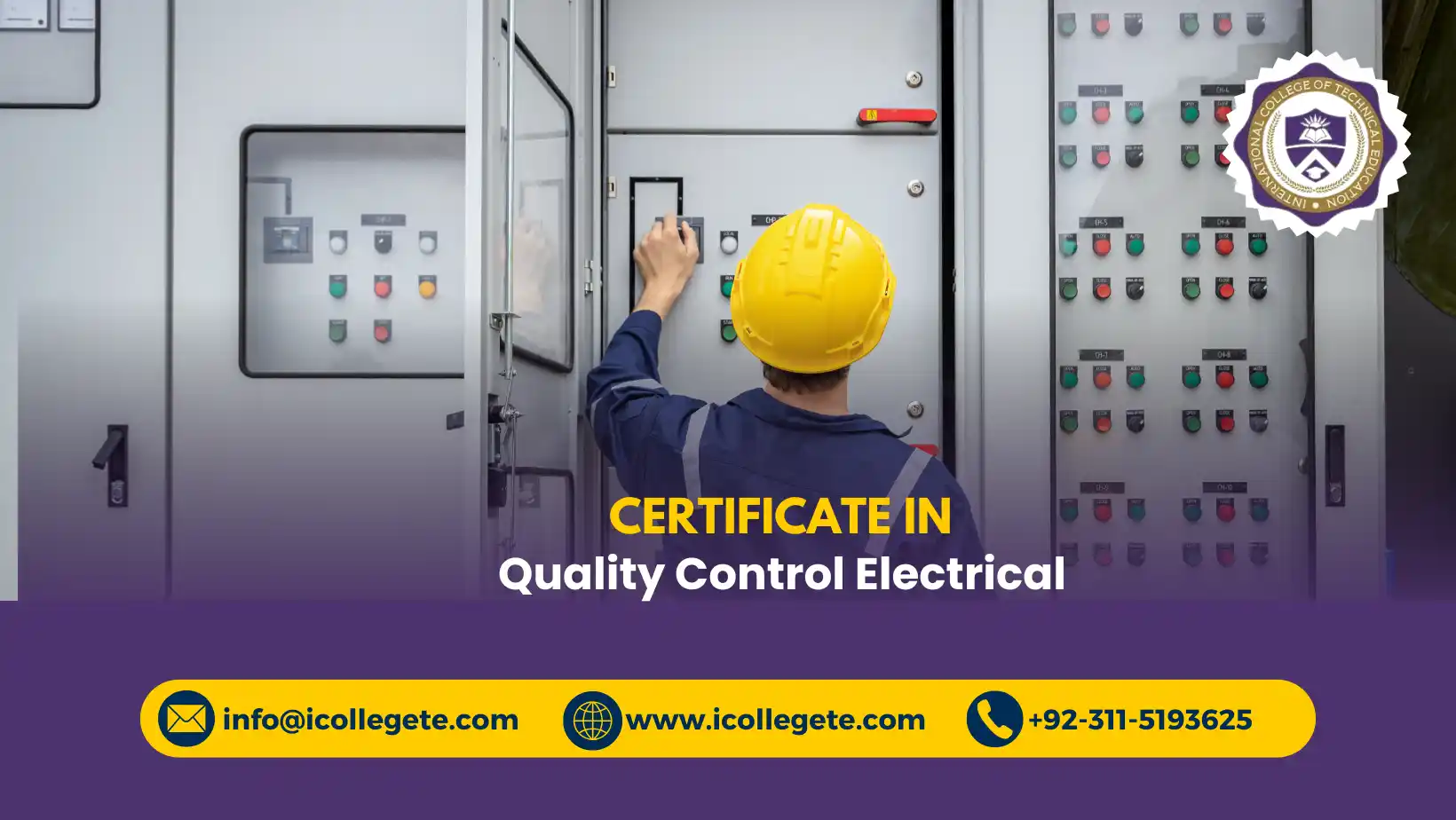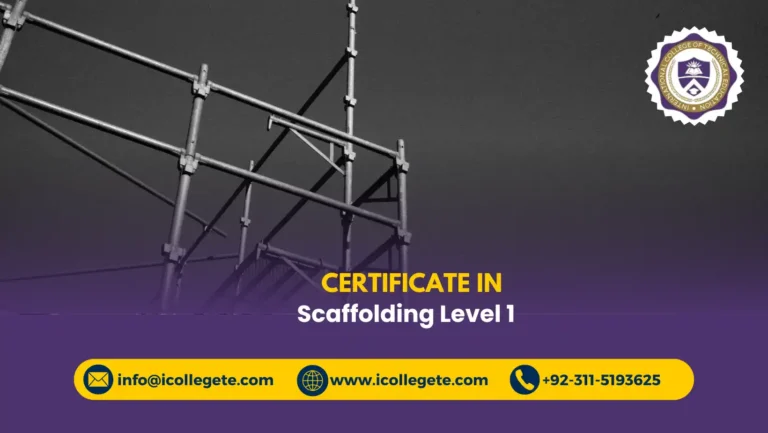Quality control in the electrical field is crucial for ensuring that electrical systems, equipment, and installations are safe, reliable, and meet the required standards. In Islamabad, a Quality Control Electrical course offers professionals and aspiring engineers the opportunity to develop a deep understanding of quality control techniques specific to the electrical industry. This course focuses on the inspection, testing, and monitoring of electrical systems, helping students ensure that all electrical projects meet national and international safety and quality standards.
The Quality Control Electrical course in Islamabad is designed to provide students with the knowledge and skills needed to maintain and improve the quality of electrical installations, products, and services. Through this course, students will learn about industry standards, inspection techniques, testing methods, and quality control systems specifically for electrical engineering. The course combines theoretical learning with practical applications, ensuring students are well-equipped to manage quality control processes on electrical projects and installations in a variety of sectors, from construction to industrial applications.
Study Units
The Quality Control Electrical course typically includes the following study units:
- Introduction to Quality Control in Electrical Engineering: This unit covers the fundamentals of quality control in the electrical industry, including the importance of quality in electrical systems and the role of quality control professionals.
- Electrical Materials and Components Testing: Learn about the various electrical materials and components used in installations and systems, as well as the methods used to test their quality and performance.
- Quality Control in Electrical Installations: Focuses on the application of quality control processes to electrical installations, covering wiring, circuit boards, switches, and other electrical components, ensuring compliance with national and international standards.
- Electrical Testing Techniques: This unit delves into the tools and techniques used for testing electrical systems, including insulation resistance testing, earth resistance testing, and testing for electrical continuity.
- Safety Standards and Compliance in Electrical Engineering: Covers the critical safety standards and regulations related to electrical systems, including national safety codes and international standards like IEC and IEEE, ensuring that electrical installations are safe and reliable.
- Statistical Quality Control for Electrical Systems: This unit teaches students how to apply statistical methods to monitor and control the quality of electrical systems and processes, using tools like control charts and process capability analysis.
- Troubleshooting and Quality Improvement in Electrical Systems: Learn how to identify and address issues in electrical systems through effective troubleshooting methods and continuous quality improvement techniques.
Learning Outcomes
Upon completing the Quality Control Electrical course, students will be able to:
- Understand the key principles and practices of quality control in the electrical industry.
- Identify and test electrical components and materials to ensure they meet the required quality standards.
- Implement and monitor quality control processes in electrical installations.
- Perform electrical testing using industry-standard techniques and tools.
- Ensure compliance with safety regulations and international standards in electrical engineering projects.
- Use statistical methods to monitor, analyze, and improve the quality of electrical systems.
- Identify and troubleshoot quality issues in electrical systems and propose solutions for improvement.
Course Benefits
- Industry-Relevant Skills: The course provides practical knowledge and hands-on experience that is directly applicable in the electrical engineering and construction industries.
- Career Advancement: Completing the Quality Control Electrical course opens up a range of career opportunities in quality control, electrical engineering, and project management, helping individuals advance in their careers.
- Enhanced Job Readiness: Students gain the skills needed to enter the workforce as quality control professionals in the electrical field, ensuring they are prepared for real-world challenges.
- Compliance Knowledge: The course covers essential regulatory standards and safety guidelines, ensuring that students are well-versed in compliance, which is a critical component of the electrical industry.
- Global Recognition: Electrical quality control professionals are in demand worldwide. By mastering quality control techniques, students position themselves for international career opportunities.
- Problem-Solving Skills: The course focuses on developing troubleshooting and problem-solving skills that are essential for addressing and resolving electrical system quality issues.
Who Is This Course For?
The Quality Control Electrical course is suitable for:
- Aspiring Electrical Engineers: Individuals interested in pursuing a career in electrical engineering with a focus on quality control and assurance.
- Electrical Technicians: Technicians working in the electrical industry who want to expand their knowledge and specialize in quality control processes.
- Project Managers: Managers who oversee electrical projects and need to ensure that all installations meet the required quality and safety standards.
- Quality Control Engineers: Professionals already working in quality control who want to deepen their expertise in the electrical field.
- Construction Professionals: Those involved in the construction industry who want to specialize in electrical systems and ensure that electrical installations meet quality standards.
Future Progression for This Course
After completing the Quality Control Electrical course, students can pursue the following pathways:
- Advanced Certifications: Students can further their qualifications by pursuing certifications in areas such as Six Sigma, ISO 9001, or other quality management systems, which can enhance their professional standing.
- Senior Quality Control Roles: Graduates can progress to higher-level roles, such as Electrical Quality Control Manager, Senior Electrical Engineer, or Quality Assurance Manager, responsible for overseeing quality control processes on large-scale electrical projects.
- Specialization in Electrical Testing: Students may choose to specialize in areas such as testing, diagnostics, or inspection, focusing on specific types of electrical systems or installations.
- Consulting: Experienced professionals can offer consulting services to electrical firms, advising on best practices for quality control, regulatory compliance, and safety in electrical systems.
- Further Education: Graduates can continue their education by pursuing a Master’s degree in Electrical Engineering or a related field, with a focus on quality control, project management, or safety.
the Quality Control Electrical course in Islamabad is an essential program for anyone looking to build a career in the electrical engineering and construction industries. The course equips students with the knowledge and skills needed to ensure the safety, reliability, and compliance of electrical systems. Whether you are just starting out or looking to enhance your career, this course provides a solid foundation in electrical quality control, offering excellent prospects for both professional growth and career advancement.





